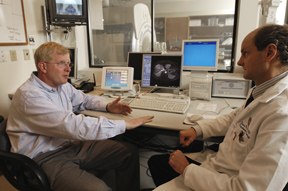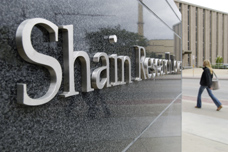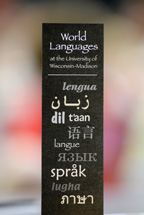
Year in Review 2005–06: Part 4
April 2006

Institutes will foster research collaboration.
The largest individual gift ever to benefit the university — $50 million from alumni John and Tashia Morgridge — paves the way for pioneering scientific collaboration at the Wisconsin Institutes for Discovery. The Morgridge donation will be matched by the Wisconsin Alumni Research Foundation and a state contribution advocated by Gov. Jim Doyle and approved by the State Building Commission. The project, which will bring together scientists from a broad spectrum of disciplines to attack the problems of disease, advance regenerative medicine and solve other important problems, will have two institutes — one private and one public — on the 1300 block of University Avenue. The private institute, to be called the Morgridge Institute for Research, will encourage collaboration with industry and enable the institute to respond more quickly to capitalize on scientific opportunities as they arise. The public institute will serve the campus community as a source of cutting-edge research and technology, and provide another venue for breaking down walls between disciplines and finding creative new ways to attack scientific problems.
Julie Curti, a senior majoring in political science and geography, is one of just 75 students named nationally as a Truman Scholar. The Harry S. Truman Scholarship Foundation awards allow students to attend graduate school in preparation for careers in government or other public service. The first UW–Madison student to receive the honor since 2000, Curti hopes to use the scholarship to pursue dual master’s degrees in urban planning and public affairs.

Bus, bike, car: options for commuters.
The broad range of transportation options available to commuters at the university lands the campus one of 12 national Best Workplace for Commuters awards given by the U.S. Environmental Protection Agency.
The university and its long-standing local partner, Madison Area Technical College, strengthen their productive relationship with a new pilot program, the student Transfer Contract. According to the pilot agreement signed by both schools, a qualified student can begin his or her postsecondary education as a freshman at MATC and two years later be guaranteed admission as a transfer student for meeting specified levels of academic achievement at MATC and the requirements for transfer admission to UW–Madison.

Cluster hiring: working together across disciplines.
Seven years after its inception, the Cluster-Hiring Initiative is producing a track record of accomplishments toward its goal of getting people outside the “academic silos” of departments to collaborate across disciplines. Collectively, the initiative has led to tens of millions of dollars in new federal research initiatives generated by either individual faculty or interdisciplinary teams. Scores of new courses have been developed, graduate training programs launched and new academic majors created. The initiative is also helping solidify the university’s leadership in key emerging fields such as nanotechnology, stem cells, energy policy, global environmental challenges and genomics, and the studies of poverty, religion and American culture.
Richard Davidson, who has devoted his career to understanding how the brain regulates human emotions, is featured in TIME magazine’s annual list of the 100 most influential people, honoring the vision, ideas and accomplishments of individuals around the world. Davidson catapulted to world fame in the early 1990s when, at the personal request of the Dalai Lama, he conducted a groundbreaking investigation into the effect of meditation on the brain.
May 2006
The university’s Posse Scholars program sees its first four graduates receive their degrees. Posse was launched in 2002, when 20 students of diverse backgrounds were recruited out of Chicago-area high schools by the Posse Foundation based on their extraordinary academic and leadership potential. They were awarded four-year scholarships and placed in supportive, multicultural “posses” of 10 students each. The idea behind the program is that a supportive network of peers and campus mentors can help students of diverse backgrounds thrive in unfamiliar surroundings.

Honoring Irving Shain.
The Irving Shain Chemistry Research Tower is dedicated on the corner of Johnson and Charter streets, as part of a two-day open house and symposium that focuses in part on the enduring effects of Irving Shain’s research into electro-chemistry. A chemistry professor and former chancellor, Shain influenced programs ranging from the Academic Computing Center to the Chancellor’s Scholars Program.
Christopher Ochoa, who served 12 years in prison for a rape and murder he did not commit, graduates from the UW Law School. Ochoa was freed from prison in 2001 with the help of the school’s Wisconsin Innocence Project. Faculty and students involved in the project began working on his case after Ochoa sent them a letter from prison saying he believed DNA testing would prove his innocence.
Early data from the Wisconsin Smokers’ Health Study suggest that treatments provided in the study are producing some of the highest quit rates ever achieved. Among study participants receiving active medication, more than 60 percent have remained tobacco-free at the end of treatment — one of the measures used by the Centers for Disease Control and Prevention.
UW–Madison Libraries and the Wisconsin Historical Society collaborate to create a National Student Leadership Archive and Resource Center, which will chronicle the history of student organizations, ranging from Habitat for Humanity to the Associated Students of Madison to the Children’s Justice Project.
June 2006
Howard Bremer, a pioneer in university-based technology transfer and a patent attorney at the Wisconsin Alumni Research Foundation, wins the 2006 Jefferson Award, an annual recognition of outstanding contributors to intellectual property law in the United States. A Wisconsin native who earned his bachelor’s and law degrees from UW–Madison, he has been called the “father of university licensing.”
The Why Files, a Web site that explores the science behind the news, celebrates its first decade. Produced under the auspices of the Graduate School, the site is the oldest continuously produced popular science magazine published exclusively online and now reaches an audience of roughly 340,000 users per month. With hundreds of articles on various aspects of science, math and technology, and winning numerous awards and accolades along the way, the project represents one of the deepest archives of popular science on the Internet.

Preserving history, tradition at Olin House.
Design work begins on a privately funded renovation of Olin House, the official residence of the chancellor. The Olin House Advisory Council, a group of community and university volunteers, recommends the extensive project to renovate the aging and failing infrastructure in recognition of the home’s tradition, history and significance to the community.

Leadership in languages.
The university heads into summer by offering 32 languages in a variety of for-credit courses, including full-immersion programs, special summer institutes and regular course offerings. A national leader in language instruction, UW–Madison is home to 11 departments of languages and literatures, 11 area studies centers covering every region of the world and the Language Institute.